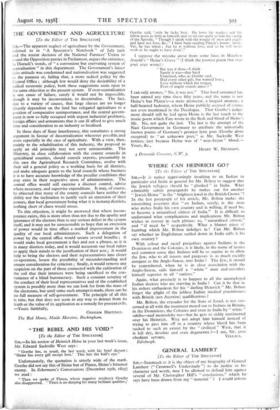THE GOVERNMENT AND AGRICULTURE [To the Editor of THE SPECTATOR]
Sta,—The apparent neglect of agriculture by the Government, referred to in " A Spectator's Notebook " of July 29th and the recent decision of the National Farmers' Union to sound the Opposition parties in Parliament, argues the existence, in Disraeli's words, of " a convenient but enervating system of centralisation " in this department. The Government's laisser faire attitude was condemned and nationalisation was suggested as the panacea or, failing that, a more radical policy by the Central Office ; although few would deny the desirability of a radical economic policy, both these suggestions seem open to the same objection as the present system. If over-centralisation is one cause of failure, surely it would not be impossible, though it may be inconvenient, to decentralise. The fact, due to a variety of. causes, that large classes are no longer directly dependent on the land has relegated agriculture to a position of comparative unimportance, and the central govern- ment is now so fully occupied with urgent industrial problems, foreign affairs and armaments that it can ill afford to give much time and consideration to an industry so localised.
In these days of State interference, this constitutes a strong argument in favour of decentralisation wherever possible, and more especially in the case of agricultuie. With a view, then, mainly to the rehabilitation of this industry, the proposal to apply an old principle may not seem unreasonable. The Ministry, in dose collaboration with the county councils in agricultural counties, should consult experts, presumably in this case the Agricultural Research Committee, evolve with their aid a general policy as a' working basis for all districts, and make adequate grants to the local councils whose business it is to have accurate knowledge of the peculiar conditions that may exist in their respective areas of administration. The central office would still exercise a discreet control, advise where necessary, and supervise expenditure. It may, of course, be objected that many of the county councils have neither the ability nok the inclination to justify such an extension of their powers, that localgovernment being what it is in many districts, nothing short of chaos would ensue.
To this objection, it might be answered that where incom- petence exists, this is more often than not due to the apathy and ignorance'of the electors than to any serious defect in the system itself, and it may not be unreasonable to hope that an extension of power would in time effect a marked improvement in the quality of our local administrators. Such a delegation of power by the central office would secure several benefits ; it would make local government a fact and not a phrase, as it is in many districts today, and it would accustom our local rulers to apply their minds to the justification of their acts ; it would help to bring the electors and their representatives into closer co-operation, lessen the possibility of misunderstanding and ensure consideration for criticism ; finally, it would remove any suspicion on the part of those connected with the cultivation of the soil that their interests were being sacrificed to the con- venience of a blind bureaucracy. Such a constant scrutiny of the conduct of their local representatives and of the established system is possibly more than we can look for from the mass of the electorate, but until some such attempt is made, there can be no full measure of self-government. The principle of all this is trite, but that does not seem in any way to detract from its truth or the value of its application as a remedy for present evils. —Yours faithfully,






































 Previous page
Previous page